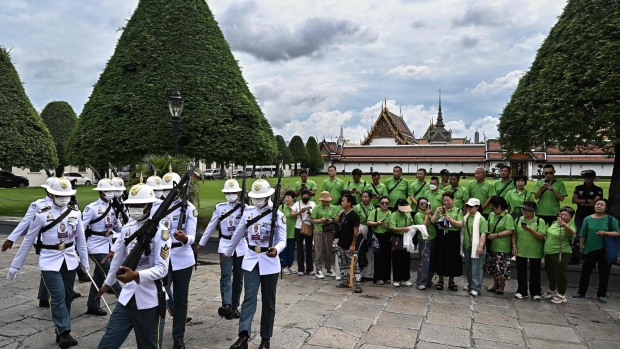Sep 18, 2023
Thailand Eyes India to Boost Tourism Recovery After Waiving Visa for China
, Bloomberg News

(Bloomberg) -- Sign up for the India Edition newsletter by Menaka Doshi – an insider's guide to the emerging economic powerhouse, and the billionaires and businesses behind its rise, delivered weekly.
Thai Prime Minister Srettha Thavisin is eyeing holidaymakers from India to boost tourism days after the Southeast Asian nation unveiled visa waivers for travelers from China and Kazakhstan starting next week.
Srettha said he plans to make a trip to India this year to meet his counterpart Narendra Modi and discuss increasing flight frequency between the two countries, including more services by flag carrier Thai Airways International Pcl.
“There aren’t that many incoming flights from India yet due to internal politics,” Srettha said in a media forum on Monday, referring to policies that seek to maintain capacity parity for carriers of both countries.
Air India Ltd., the former flag carrier, is in the midst of renewing its fleet and may or may not readily have enough jets to deploy on routes to Thailand should Thai Air be allowed more services to India.
The Southeast Asian nation may consider other measures to boost Indian tourist arrivals, such as offering tax exemptions on jewelry imported for Indian weddings held in Thailand, a popular destination for such ceremonies, he said. As Indian tourists can already easily obtain Thai visas, a waiver of this requirement may not be necessary, he said.
Srettha’s comments came a week after his cabinet approved temporary visa exemptions for Chinese and Kazakh tourists ahead of the high season. Tourists from the two countries can enter Thailand without a visa between Sept. 25 and Feb. 29 next year and can stay for a maximum of 30 days at a time.
The visa waiver program is expected to bring in 35 billion baht ($980 million) from Chinese tourists, Srettha said during the forum.
Chiang Mai Airport, located in northern Chiang Mai province, will operate flights on a 24-hour basis from Nov. 1 to accommodate demand from Chinese visitors and the recently approved visa-free policy, government spokesman Chai Wacharonke said after Monday’s cabinet meeting.
“The airport traditionally operates flight time for 18 hours per day, but there has been demand from Chinese, Japanese and Korean tourists for late night flight operations so they can return to work in the morning upon landing in their countries,” said Chai.
Thailand has been ramping up measures to boost the travel industry, a key growth driver of Southeast Asia’s second-largest economy. It aims to raise tourism revenue to its pre-Covid levels, with a target of 3.1 trillion baht in 2024.
Thailand has welcomed 18.5 million foreign tourists so far this year with as many as 28 million expected by the year-end. Revenue from foreign travelers totaled 775 billion baht as of Sept. 11, according to the tourism ministry. The nation hosted a record 40 million tourists in 2019.
--With assistance from Pathom Sangwongwanich.
(Updates with comments from government spokesman on seventh and eighth paragraphs.)
©2023 Bloomberg L.P.


